Total Credits: 20.0 including 20.0 AOA Category 1-A, 20.0 AMA PRA Category 1

Accreditation
The Arizona Osteopathic Medical Association (AOMA) is accredited by the American Osteopathic Association (AOA) to provide osteopathic continuing medical education for physicians.
The AOMA designates this program for a maximum of 20.0 hours of AOA Category 1-A credits and will report CME and specialty credits commensurate with the extent of the physician's participation in this activity.
The Arizona Osteopathic Medical Association (AOMA) is accredited by the Accreditation Council for Continuing Medical Education (ACCME) to provide continuing medical education for physicians.
The AOMA designates this enduring material for a maximum of 20.0 AMA PRA Category 1 Credits™. Physicians should claim only the credit commensurate with the extent of their participation in the activity.
AOMA Grievance Policy: The Arizona Osteopathic Medical Association strives to provide continuing medical education programs that fulfill the needs of attendees and meet the requirements of AOA Accreditation and ACCME Accreditation. Comments, questions, or complaints should be submitted in writing to Teresa Roland, Director of Education, by mail to AOMA, 3039 W. Peoria Ave, Suite C102-158, Phoenix, AZ 85029, or email teresa@azosteo.org.
| Topics in precision medicine | View | ||
| Heart failure management: 2024 | View | ||
| Hospice? My patient? Why? | View | ||
| Viscerosomatic and Somatovisceral Reflexes in Neurological Models of Osteopathy | View | ||
| Viscerosomatic and somatovisceral reflexes | View | ||
| Developmental delay: From screening to treatment | View | ||
| Pearls in adult epilepsy management | View | ||
| Valley fever: What can we do about it? Epidemiology, diagnosis and vaccines | View | ||
| Managing endemic mould infections (Coccidioidomycosis) | View | ||
| Osteopathic Philosophy: Interpreting A.T. Still’s Writings | View | ||
| The ABC's of pediatric rheumatology | View | ||
| Principles of obesity management | View | ||
| Treatment of diabetes mellitus - 2024 updated guidelines | View | ||
| The gut-heart connection | View | ||
| Osteopathic manipulative treatment for the neonatal abstinence syndrome (NAS) infant | View | ||
| Valley Fever: From diagnosis to advocacy to treatment | View | ||
| Who's in charge: Advance care planning | View | ||
| Sepsis Syndrome | View | ||
| Optimizing opioid management while mitigating risk in the chronic pain patient | View | ||
| The present and future of pain management | View | ||

Dr. Carnahan is a board-certified Neurologist and a fellowship-trained Epileptologist. She attended medical school at Kansas City University of Medicine and Biosciences in Kansas City, Missouri and completed her internship and residency in Neurology at Loyola University Medical Center, Stritch School of Medicine in Maywood, Illinois. Her epilepsy fellowship was completed at Beth Israel Deaconess Medical Center, Harvard Medical School in Boston, Massachusetts. She is also an accomplished classical pianist.

Martin A. Cerda, DO is a native of Florida. He grew up along the east coast of Florida in a town called Titusville, Florida. He attended the University of Florida for his undergraduate studies, followed by the Georgetown University School of Medicine for his post-baccalaureate studies. He won a National Institute of Health intramural research grant for his studies in matrix metalloproteases in coronary artery disease. Led by his mentor, Larry Wahl, at the National Institutes of Dental and Craniofacial research, Martin Cerda was authored in several scientific papers and journals.
He completed his medical education at Touro College of Osteopathic Medicine in Harlem, New York, after which he went back to his home state of Florida to complete his internship and residency at the University of Florida – Jacksonville. He remained there to serve as Chief Resident, followed by his general cardiology fellowship at the University of Florida, where he remained for additional electrophysiology training. He is board certified in Internal Medicine and Cardiology and now is in private practice in Scottsdale, Arizona.

Susie Cymbor, MD is a board certified in General and Pediatric Anesthesiology who provides bedside hospice care. She was born in the United States, attended medical school in Krakow, Poland and completed her residency and fellowship at the University of New Mexico. She went on to complete a Medical Education Fellowship. As an academic physician, she practiced and was educated at the University of New Mexico and the University of Arizona. As the Assistant Dean at the Lerner College of Medicine at the Cleveland Clinic, she created a problem-based learning curriculum for the basic sciences curriculum. Subsequently, she practiced medicine in Arizona and New Mexico. She worked as a Joint Commission Surveyor and then as a Quality Improvement Consultant for hospitals across the country.

Dr. William Devine has always had an interest in Osteopathic Manipulative Medicine (OMM). He comes from a family of osteopathic physicians, including his father and two uncles. He was born at the maternity hospital on the campus at Kansas City College of Osteopathic Medicine where he delivered his first as a medical student. After osteopathic medical school he expanded his interests in osteopathic manual medicine along with interests in medical education, medical history, medical research, and medical health policy. He integrated osteopathic concepts and philosophy into his present osteopathic manual medicine practice as it relates to Osteopathy. He is nationally and internationally known and respected as a lecturer and author of topics in osteopathic manipulative medicine.
He left his active osteopathic family practice 1996, to become one of the original founders of the new Midwestern University Arizona College of Osteopathic Medicine campus and served for 26 years achieving the rank of Clinical Professor. At MWU and presently he continues postgraduate osteopathic teaching and a private practice He has presented at workshops, keynote presentations at the AzAO, AAO, AOMA and internationally in the UK, Italy, Germany, Taiwan, Turkiye, Denmark and Norway. He has been honored with many awards over the years for his service to osteopathic medicine and teaching with the most prestigious Andrew Taylor Still Medallion of Honor Award conferred by the American Academy of Osteopathy in 2025.
Today he is recognized by many medical organizations nationally and internationally in his medical specialty of Osteopathic Neuromusculoskeletal Medicine and Osteopathic Manipulative Medicine (NMM and OMM). He has co-authored two textbooks on Clinical Counterstrain Osteopathic Manipulation and has written and coauthored chapters in five medical textbooks, and many research papers. He has presented nationally and internationally with keynote addresses, workshops, and lectures. He is board certified in family medicine and OMT, as well as neuromusculoskeletal medicine and osteopathic manipulative medicine. He had Fellowship training at the Research Center in Fort Worth, Texas. His private practice in now is focused on neuromusculoskeletal medicine and osteopathic manipulative medicine.
And he continues to teach post graduate medical education as a Clinical Professor at Midwestern University, Arizona Post Graduate Medical Education program and he teaches at ATSU SOMA, as faculty in the Department of Osteopathic Manipulative Medicine, and continues to teach at state, national and international presentations.

Dr. Fariba M. Donovan received her medical degree at The Shiraz University of Medical Sciences in Iran and completed her internal Medicine residency at Good Samaritan Hospital in Cincinnati, Ohio. She then completed her infectious disease fellowship at the University of South Florida in Tampa, Florida.
During her graduate studies in Japan after her medical school her research focused on C. albicans virulence factors. She later in postdoctoral fellowship focused on Coccidioides urease as a virulence factor and was able to mutate the gene in Coccidioides and constructed a less virulent strain.
She joined the faculty at the University of Arizona in 2017 and has been focusing on early pathogen-host interaction in coccidioidomycosis. She is studying early coccidioidomycosis events to better understand altered or dysfunctional metabolic pathways as evidence of genetic alterations and a risk factor for severe coccidioidomycosis or disseminated coccidioidomycosis (DCM).
Her clinical research focuses on the earlier and improved diagnosis of Valley fever. Her clinical research goals include the development of more rapid, reliable, and cost-effective Valley fever point-of-care testing which will speed up and improve diagnostic accuracy and antimicrobial stewardship. She completed a prospective study evaluating a rapid LFA test for Valley fever diagnosis. Her earlier work has demonstrated the human and financial burden of delays in Valley fever diagnosis. Her work epitomizes the goal of taking basic research and applying it at the bedside for the benefit of the entire community. Additionally, she is developing plans to study the host innate immune response to Coccidioides with a focus on the early events in coccidioidomycosis.
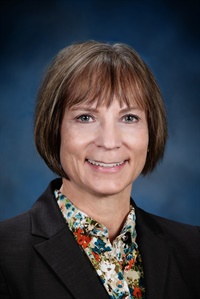
Karen B. Everitt, JD, BSN, joined Mutual Insurance Company of Arizona (MICA) in June 2019 as vice president of risk management services. Karen has over 30 years of critical care nursing, legal, and medical professional liability insurance experience and history of successfully driving change. Her team contributes to MICA’s historically outstanding service and mission to protect and defend the practice of medicine with research-driven expertise, effective risk assessments and consultation, and pertinent liability and risk management content. She earned a Bachelor of Science in Nursing degree from Auburn University and a Juris Doctor degree from the University of Alabama. Karen is a member of the Alabama State Bar, the American Health Lawyers Association, Defense Research Institute, and the American Society for Health Care Risk Management.

Dr. Ferenczi is a clinical endocrinologist practicing in a large single specialty group in Scottsdale, Arizona. After graduation from medical school, she completed her residency program at The New York Hospital Medical Center of Queens, NY and my fellowship in endocrinology, Metabolism and Diabetes at Beth Israel Medical Center, Albert Einstein College of Medicine New York, NY. She has been involved in all aspects of endocrine disease states, diabetes, thyroid, parathyroid, bone diseases. She is also one of the few endocrinologists that performs thyroid nodule radiofrequency ablation therapy. During her career, she has implemented standards of care for diabetes management in hospitalized patients, helped implement an ADA certified diabetes educational center, started a thyroid clinic and, most recently, RFA of thyroid nodules.
She is also involved in teaching residents, medical students, PAs and nursing students about endocrinology and was involved with thyroid ultrasound/biopsy national committees.

Dr. Galgiani received his medical degree from Northwestern Medical School, completed a fellowship in Infectious Diseases at Stanford and has been on the faculty of the University of Arizona since 1978. He has focused his career on the special problem of coccidioidomycosis, also known as Valley fever, including studies of the impact of Valley fever on the general population and on special groups such as organ transplant recipients and patients with AIDS. He is the lead author on the Infectious Diseases Society of America’s practice guidelines for coccidioidomycosis. In 1996, Dr. Galgiani founded the Valley Fever Center for Excellence. In collaboration with Banner Health, Dr. Galgiani developed and is now implementing a training program for primary care clinicians for prompt recognition and optimal management of patients with new Valley fever infections. The Center’s research has recently developed a vaccine candidate to prevent Valley fever in dogs and potentially in humans.

Patrick W. Hogan, DO is a double-certified in Pain Management and Anesthesiology specialist (American Board of Anesthesiology). Dr. Hogan and his business partner, Dr. Tristan Pico, MD founded a large multidisciplinary pain management practice in the Phoenix Metro area called “AZ Pain Doctors”. They have 9 locations valley-wide.
Dr. Hogan primarily focuses on interventional pain management techniques, but his practice offers a full spectrum of acute and chronic pain management, including medication management.
Dr. Hogan completed medical school at Midwestern University/AZ College of Osteopathic Medicine, and then completed residency and pain management fellowship training at the Cleveland Clinic in Ohio.
Dr. Hogan is married with 3 children and enjoys quiet time on the beach and skiing with his children.

Dr. Garilyn Jentarra is a Professor at Midwestern University in Glendale, Arizona. She is also the Director of Midwestern’s Precision Medicine Program which educates students in all of the healthcare professions on the use of genetic, genomic, and biomarker technologies in medical practice. Dr. Jentarra completed her PhD at Arizona State University where she worked on developing a safer vaccinia virus strain for smallpox vaccination. Subsequently, she completed a post-doctoral fellowship in a neurogenetics laboratory at the Barrow Neurological Institute in Phoenix. While there, she studied neurogenetic disorders including Rett syndrome, tuberous sclerosis complex, and neurofibromatosis type 1. Upon joining Midwestern University, she also branched into Alzheimer’s disease research, which has since become her primary field of research. Dr. Jentarra works closely with the Arizona Alzheimer’s Consortium to support a broader Alzheimer’s disease research program at Midwestern.
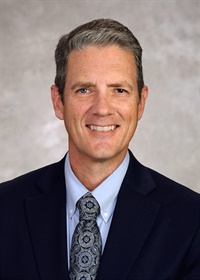
Dr. Keane currently works as an Assistant Professor, Medical Director of the Osteopathic Medicine Center Arizona and Chair of the Osteopathic Principles and Practice Department within the School of Osteopathic Medicine in Arizona on the A.T. Still University Mesa Campus. In his continued learning, he has been focused on pain management, especially chronic pain and the associated hypo-dopaminergic state, as well as treatment of opioid addiction, PTSD, and neurophysiologic mechanisms of pain. Having recently moved from the clinical to medical education arena, he is excited to serve as co-investigator for the proposed project, Noninvasive multiparametric characterization of myofascial pain syndrome and its responses to osteopathic manipulative treatment.
After decades of managing on his own health and wellness interests, initially with Tai Chi/Traditional Chinese Medicine and self-guided learning about nutrition, he left a developing career in public policy to more directly use the knowledge and skills he had learned to help others with their health. The idea of becoming a physician to help reduce suffering was irresistible. After several years of pre-medical training, he was accepted to medical school. After completing an internal medicine residency and board certification (he is currently a Fellow in the American College of Osteopathic Internists and in the American College of Physicians), a secondary board-certification in integrative holistic medicine and extensive post-graduate training in osteopathic manipulative medicine, he continues to look for opportunities to enrich his understanding and practice of medicine. Thus, he is especially grateful for this opportunity to blend the art of osteopathic clinical care with the science of evidence based assessment and objective analysis. He feels that his experience, particularly with regard to clinical care, osteopathic principles, and osteopathic manipulative medicine, makes him qualified to provide expertise in the design, development, and implementation of the study proposed in this application.

Originally from Minnesota, Dr. Klatt attended AZCOM for medical school. She then went on to complete a family medicine residency, where she developed a passion for preventive and metabolic health. After obtaining an additional board certification in obesity medicine, Dr. Klatt has returned to her alma mater, where she now teaches and practices. She enjoys helping her patients optimize their health and quality of life and looks forward to working with the next generation of osteopathic physicians.

Marquis Mayberry is a rising fourth-year medical student at Midwestern University’s Arizona College of Osteopathic Medicine (AZCOM) and is currently working on his Applied Master of Osteopathic Education. He is an undergraduate fellow who works with the osteopathic medical faculty to teach osteopathic manipulative medicine to first- and second-year medical students.

Dr. Muldoon received her Ph.D. (Anthropology) from Washington University in St. Louis. She is Professor of Anatomy at Midwestern University, Glendale, AZ. She is Director of Humanity in Medicine and the courageous conversation training course Medical Improv for medical and allied health students. She is an award-winning educator and was named the 2023 Northup Educator of the Year by the national Student Osteopathic Medical Association. Dr. Muldoon maintains several distinct areas of scholarly research, including evaluating methods for prevention of congenital cytomegalovirus (CMV) infection through professional education, and promotion of CMV awareness and behavioral interventions in the community. Dr. Muldoon's research has been funded by the National Science Foundation, National Geographic Society, American Philosophical Society, and Vitalyst Foundation, among others. She has given more than 200 research seminars and outreach workshops nationally and internationally. Her work has been featured on National Public Radio, USA Today, in the CMV memoir Remedies for Sorrow, and several podcasts. Dr. Muldoon chaired the Arizona College of Osteopathic Medicine Curriculum Taskforce on Diversity and is a member of several academic and state committees relating to diversity advocacy and disability services. She is a consultant for Moderna and the University of Arizona College of Medicine, Phoenix, and served as Chair of the Scientific Advisory Committee at the National CMV Foundation. She co-founded Stop CMV AZ/Alto CMV AZ in 2021 and is a board member for the Arizona Hands and Voices and Care 4 the Caregivers. Dr. Muldoon is the proud mother of three children: her middle child has multiple disabilities due to congenital CMV.

Dr. Murthy is a board-certified Infectious Disease specialist practicing in the Phoenix metro area for the last 16 years. He completed my ID fellowship training at Creighton University-School of Medicine, Omaha, NE in 2008. In addition to providing comprehensive Infectious Diseases specialty care, he also participates in various leadership activities and faculty teaching at hospitals.
He founded nodSpecialists (network of doctors) virtual Infectious Disease specialty platform in 2018 to improve access to specialty care. During the COVID-19 pandemic, our team provided comprehensive ID support to community rural hospitals, SNFs as well as larger acute care hospital centers. His true passion is to improve access to quality specialty care that provides good outcomes for the patients at a lower cost of care.

Dr. Emily Parke, DO is board certified in anesthesiology and pediatric anesthesiology, trained in medical acupuncture, peptide therapy, anti-anti-aging medicine and is certified in Functional Medicine.
She completed Anesthesia Residency at the Cleveland Clinic, where she served as Chief Resident, and her pediatric and pediatric cardiac anesthesia fellowship at the Children’s Hospital of Philadelphia, where she served as Chief Fellow.
She then went to be the Founder and CEO of Arizona Wellness Medicine, where she currently practices.

Dr. Pico attended Claremont McKenna College where he attained his Bachelor of Science in Biology and Economics. He then attended the University of Alabama School of Medicine in Birmingham where he attained his Doctor of Medicine degree. Internship was undertaken at Baptist Health in Birmingham followed by residency in Anesthesiology at University of Alabama in Birmingham. He then undertook a fellowship in Chronic Pain Management at MD Anderson Cancer Center in Houston.
Dr. Pico is the co-founder of AZ Pain Doctors which has 9 clinics throughout the greater Phoenix area staffed by 7 physicians, 3 chiropractors, and 13 advanced practice providers. AZ Pain Doctors has a strong focus on providing the widest array of therapies to their patients and serving the patients and referring physicians by accepting almost all insurance plans offered in Arizona

Deborah Jane Power, DO is a native of San Pedro, California and has been practicing medicine in Arizona for over 22 years. She received her Bachelor of Science in Kinesiology from the University of California, Los Angeles and a Master of Science in Exercise and Sport Sciences at The University of Arizona. She earned her D.O. degree in 1997 at the Kirksville College of Osteopathic Medicine, Kirksville, Missouri and interned at Midwestern University/Arizona Graduate Medical Education Consortium at Tucson General Hospital. Dr. Power completed her rheumatology fellowship at the University of Arizona in 2002 where she held a faculty position for three years before starting a group practice in rheumatology in Tucson, Arizona.
Dr. Power is a Fellow of the American College of Osteopathic Internists as well as the American College of Rheumatology. She has served as faculty for the Pediatric residency at Tucson Hospitals Medical Education Program, Tucson Medical Center since July 2019.
She has participated as an investigator in over 70 clinical trials and has presented both nationally and internationally.

Dr. Rashid attended UCLA on an academic scholarship and graduated cum laude with a Bachelor of Science degree in Biology. He later attended medical school at Midwestern University (where he met his future wife, who is now a physician-partner with Affiliated Hospitalists in Phoenix and Scottsdale). Dr. Rashid started his residency training in Anesthesiology at UT Southwestern Medical Center but soon realized his passion for Internal Medicine and managing complex diseases. He completed an Internal Medicine residency at Methodist Dallas Medical Center and served as Chief Resident. He then returned to Arizona to complete his Rheumatology fellowship at the University of Arizona in Tucson and served as Chief Fellow during his final year of fellowship.
Dr. Rashid is board-certified in Rheumatology and Internal Medicine by the American Board of Internal Medicine and teaches the joint aspiration and injection workshop at the annual American College of Physicians national meeting. He has a strong interest in medical education and has been appointed Clinical Assistant Professor by AZCOM/Midwestern University, University of Arizona College of Medicine-Phoenix, and Creighton University School of Medicine. In addition to giving traditional clinical rheumatology lectures at the medical schools, he frequently has medical students rotating with him in his clinic.
He is the team rheumatologist for the Cincinnati Reds during their Arizona activities and has helped high-performing athletes recover from rheumatologic diseases and return to various levels of professional baseball, including Major League Baseball.
Serving on the Board of Trustees of the Arizona Osteopathic Medical Association has allowed him and other physicians to strongly advocate for patients to receive the medical treatments they deserve.

Dr. Jennifer Shuey, DO, is a Clinical Assistant Professor at Midwestern University’s Arizona College of Osteopathic Medicine, where she contributes her expertise to the Department of Osteopathic Family and Community Medicine. Board-certified in Family Medicine with Osteopathic Manipulative Treatment (OMT), Dr. Shuey is a distinguished graduate of the 2021 class of Midwestern University Chicago College of Osteopathic Medicine. Dr. Shuey completed her residency in Family Medicine at Resurrection Hospital in Chicago, where she notably revitalized the developmental screening process. With broad practice in family medicine, she has been an advocate for osteopathy and family medicine at both state and national levels.
While practicing at a Catholic hospital Dr. Shuey advocated for her patients and obtained permission form the catholic church to prescribe contraception that was never allowed prior for medical concerns.
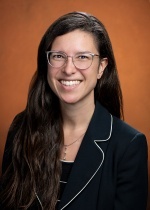
Eren Ural, DO, C-AOBNMM, graduated from undergraduate studies at University of Michigan, received her osteopathic medical degree from Michigan State University College of Osteopathic Medicine, and completed her residency in neuromusculoskeletal medicine in Ronceverte, West Virginia. After working for one year as an attending with the ONMM residency at Cleveland Clinic and teaching at OHUCOM, she completed a pain medicine fellowship with a strong focus on prolotherapy in Columbus, Ohio. She then returned to Cleveland Clinic as the Director of Osteopathic Education in charge of 4 osteopathically recognized residencies (Internal medicine, Anesthesiology, Orthopedic surgery, and General surgery) before her move to AZCOM. Currently, she practices mostly in the outpatient and academic settings, with major roles as core faculty with the ONMM3 residency and Program Director of the Applied Master of Osteopathic Education at AZCOM.
What fuels her in the career arena is discovering and mastering new clinical modalities and finding patterns in their most efficient application to patient care, working with students and residents on improving awareness and skills in osteopathic clinical medicine, innovating team-led high-quality research and QI projects, and optimizing the full breadth of academic medicine endeavors from high school prospective students each step of the way to and through the level of attending physicians. Outside of work, her passions include travel, meditation and mindfulness, semiprofessional doubles beach volleyball, and charcoal drawing.
Online Attestation & Evaluation Instructions
To receive continuing medical education credits for the Arizona Osteopathic Medical Association's (AOMA) 44th Annual Fall Seminar, you MUST complete the online attestation and evaluation form for the hours attended by December 31, 2024. Follow the steps below to complete your attestation:
Log into your account on our website, azosteo.org.
In the upper right-hand corner, click on sign in or if it has your name, click on your name.
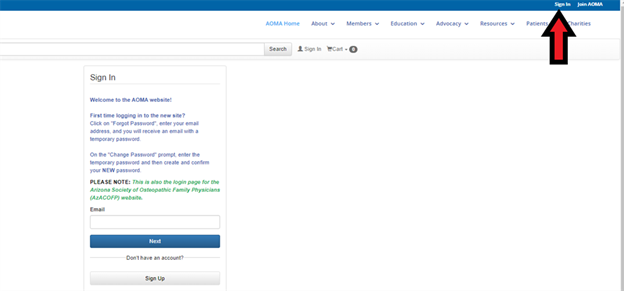
On your main account page click the My List Tab. Your previous purchases will appear.
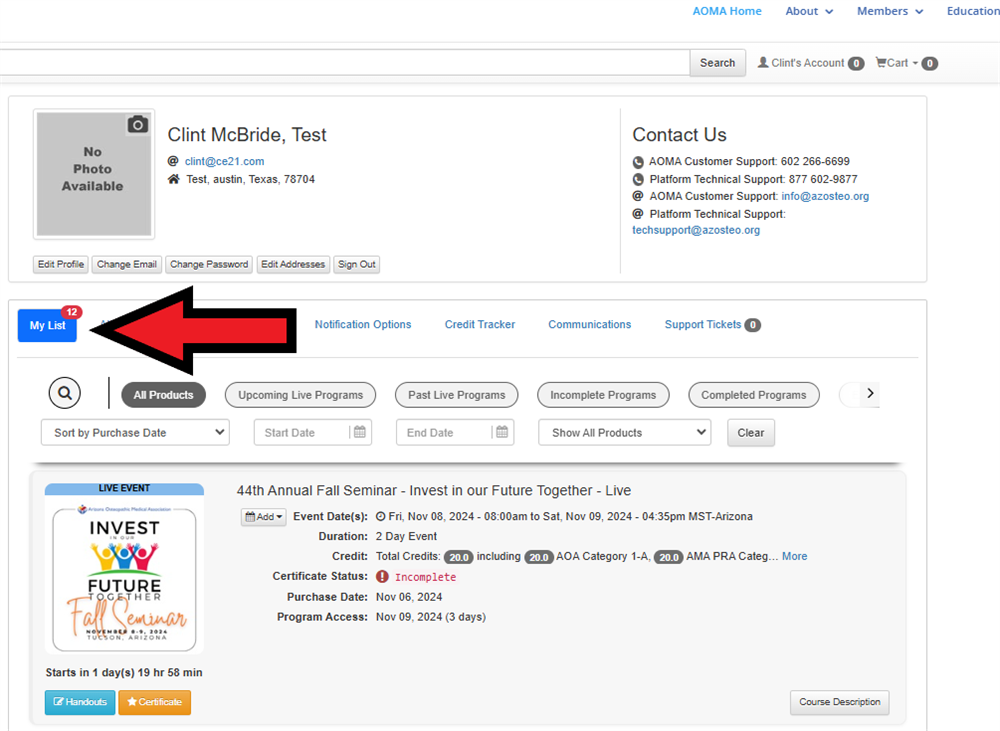
Find the 44th Annual Fall Seminar.
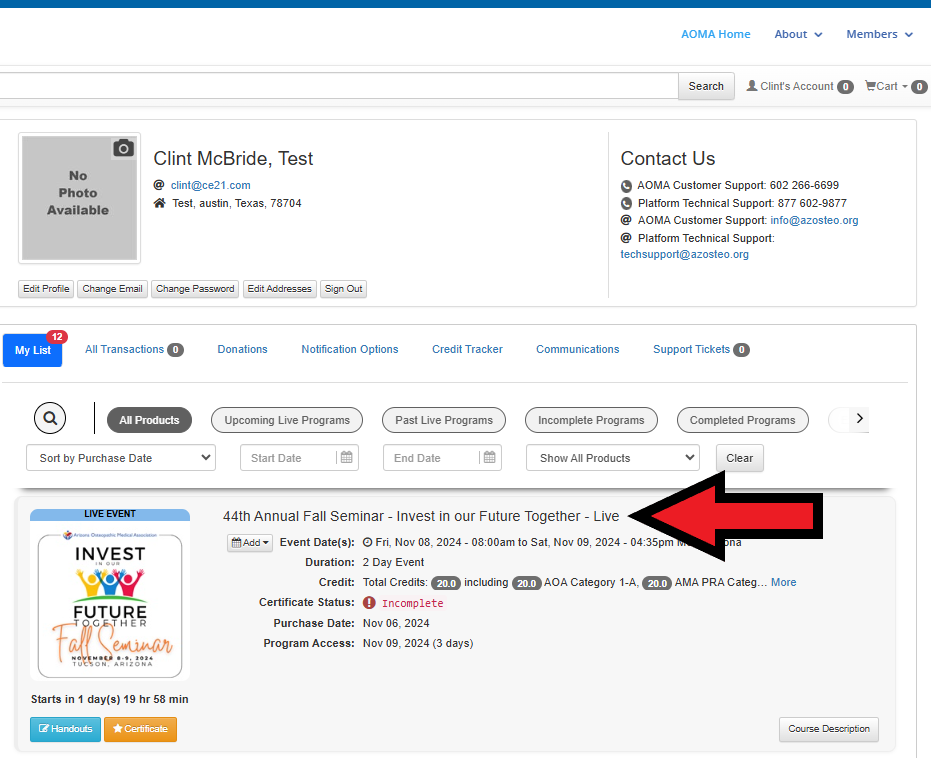
Click the gold certificate button.
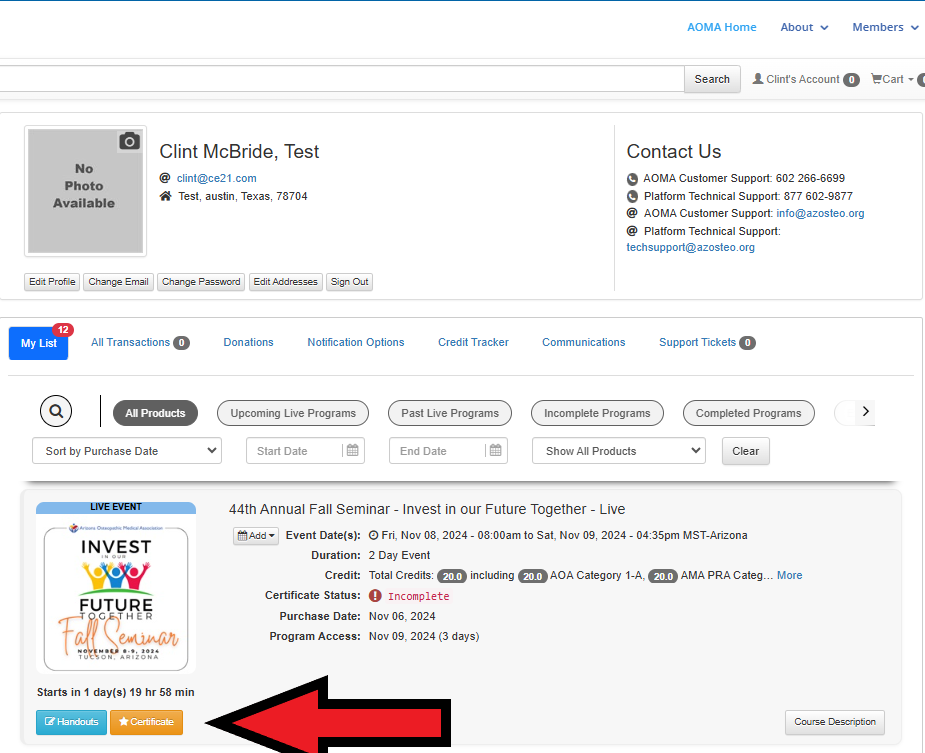
Click on Customer Attendance Confirmation. You must attest to each lecture you saw to receive credit. Make sure you hit submit after attesting to each lecture.
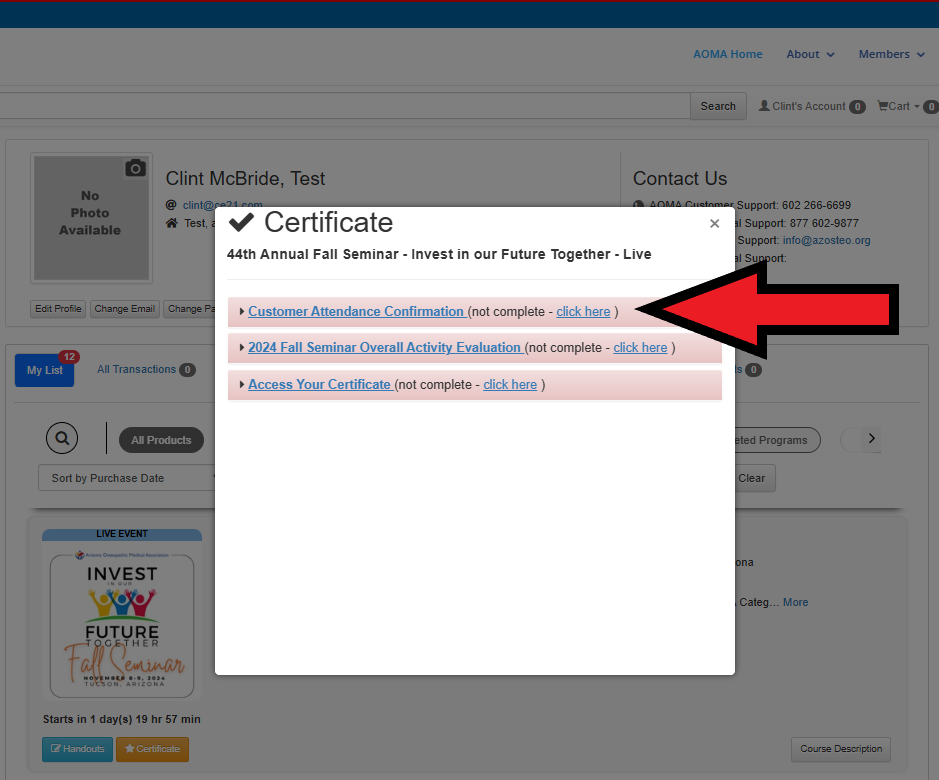
Be sure to complete the overall activity evaluation in order to print or email your CME certificate.
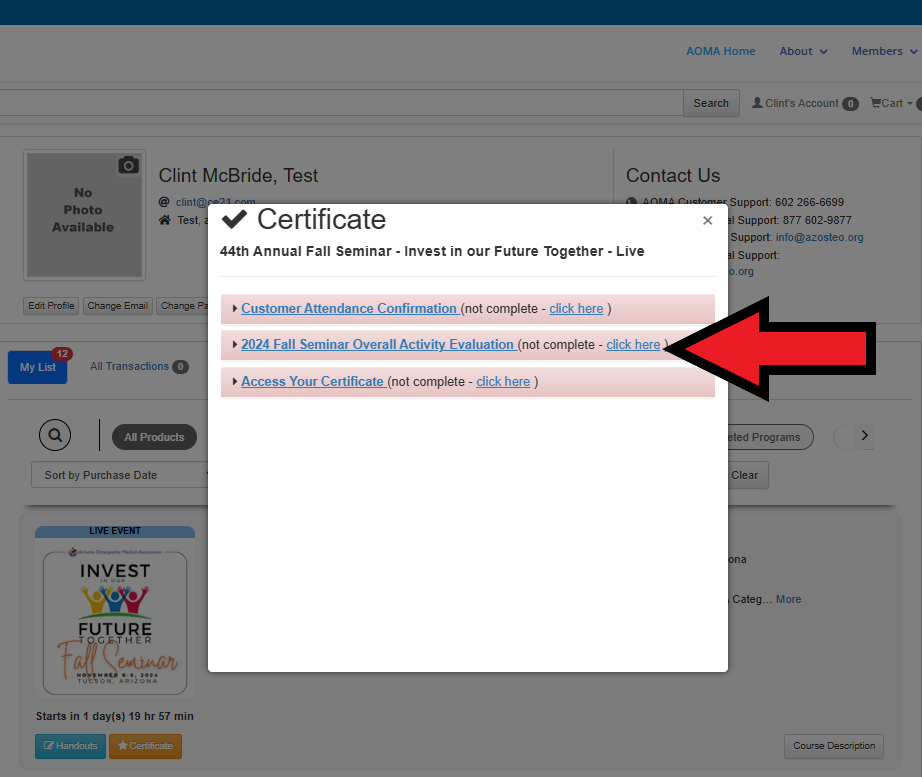
After completing the Customer Attendance Confirmation and the 44th Annual Fall Seminar Overall Activity Evaluation, you may then print or email your CME certificate. Please be sure to check your CME certificate to make sure the hours are correct.
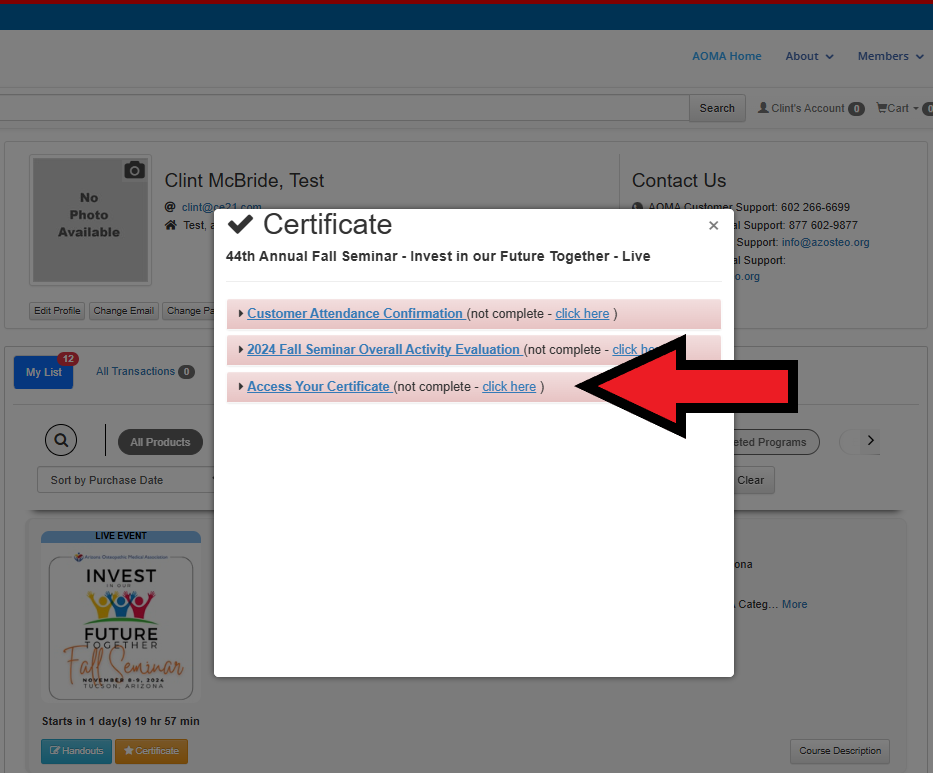
To avoid additional fees for issuance of CME credits for the AOMA 44th Annual Fall Seminar, all attestation forms MUST be completed by December 31, 2024. After this date, online access to the attestation forms will be closed and requests for CME credits from the AOMA 44th Annual Fall Seminar will be subject to a $25 fee.
AOMA will report credits to the American Osteopathic Association (AOA) by December 31, 2024.
Please contact Teresa Roland, Director of Education, at teresa@azosteo.org or 602-266-6699 with questions.
Arizona Osteopathic Medical Association
44th Annual Fall Seminar
Invest in our Future Together
On-Demand
20.0 Credit Hours
Click on the title of the lecture, it will take you to the video.
Topics in precision medicine with an emphasis on mRNA-based technologies
Garilyn Jentarra, PhD
CREDIT HOURS: 1
Heart failure management: 2024
Martin Cerda, DO
CREDIT HOURS: 1
Hospice? My patient? Why?
Susie Cymbor, MD
CREDIT HOURS: 1
Viscerosomatic and somatovisceral reflexes in neurological models of osteopathy
William Devine, DO & James Keane, DO, MEd, FACOI, FACP
CREDIT HOURS: 1
Developmental delay: Screening to treatment
Jennifer Shuey, DO
CREDIT HOURS: 1
Pearls in adult epilepsy management
Louann Carnahan, DO
CREDIT HOURS: 1
Valley fever: What can we do about it? Epidemiology, diagnosis and vaccines
John Galgiani, MD
CREDIT HOURS: 1
Managing endemic mould infections (Coccidioidomycosis)
Fariba Donovan, MD, PhD, FACP, FIDSA
CREDIT HOURS: 1
Osteopathic Philosophy: Interpreting A.T. Still’s Writings
James Keane, DO, MEd, FACOI, FACP
CREDIT HOURS: 1
The ABC's of pediatric rheumatology
Deborah J. Power, DO, MS, FACR, FACOI
CREDIT HOURS: 1
Principles of obesity management
Kimberly Klatt, DO, DAOBFP, DABOM
CREDIT HOURS: 1
Treatment of diabetes mellitus - 2024
Andrea Ferenczi, MD
CREDIT HOURS: 1
The gut-heart connection
Emily Parke, DO, DABA, IFMCP
CREDIT HOURS: 1
Osteopathic manipulative treatment for the neonatal abstinence syndrome (NAS) infant
Erin Ural, DO, C-AOBNMM
CREDIT HOURS: 1
Optimizing opioid management while mitigating risk in the chronic pain patient
Patrick Hogan, DO
CREDIT HOURS: 1
The present and future of pain management
Tristan Pico, MD
CREDIT HOURS: 1
Valley Fever: From diagnosis to advocacy to treatment
Kathleen Muldoon, PhD & Marquis Mayberry, OMS-IV
CREDIT HOURS: 1
Who's in charge: Advance care planning
Karen B. Everitt, JD, BSN
CREDIT HOURS: 1
Sepsis Syndrome
Madhu Murthy, MD, MHSA
CREDIT HOURS: 1
Autoimmune Arthritis: The Intersection of Immunology and the Musculoskeletal System
Hani Rashid, DO, FACR
CREDIT HOURS: 1
Disclosures
Faculty and Planning Committee Disclosures
The following faculty and/or planning committee members have indicated that they may have a relevant financial relationship with an ineligible company that could be perceived as a potential conflict of interest.
Faculty Disclosures
Planning Committee Disclosures
Speaker Disclosures
All relevant financial relationships have been mitigated.
All other faculty and planning committee members have no relevant financial relationships with ineligible companies.
Disclosure of Unlabeled/Unapproved Use of Drugs and/or Products:
Accreditation
The Arizona Osteopathic Medical Association (AOMA) is accredited by the American Osteopathic Association (AOA) to provide osteopathic continuing medical education for physicians.
The AOMA designates this activity for a maximum of 20.0 hours of AOA Category 1-A credits and will report CME and specialty credits commensurate with the extent of the physician's participation in this activity.
The Arizona Osteopathic Medical Association (AOMA) is accredited by the Accreditation Council for Continuing Medical Education (ACCME) to provide continuing medical education for physicians.
The AOMA designates this live activity for a maximum of 20 .0 AMA PRA Category 1 Credits™. Physicians should claim only the credit commensurate with the extent of their participation in the activity.
2024 AOMA Fall Seminar On-Demand Agenda
Learning objectives:
Learning objectives:
Learning objectives:
Learning objectives:
Learning objectives:
Learning objectives:
Learning objectives:
Learning objectives:
Learning objectives:
Learning objectives:
Learning objectives:
Learning objectives:
Learning objectives:
Learning objectives:
Learning objectives:
Learning objectives:
Learning objectives:
Learning objectives:
Learning objectives:
Learning objectives:
Faculty and Planning Committee Disclosures
The following faculty and/or planning committee members have indicated that they may have a relevant financial relationship with an ineligible company that could be perceived as a potential conflict of interest.
Faculty Disclosures
Planning Committee Disclosures
Speaker Disclosures
All relevant financial relationships have been mitigated.
All other faculty and planning committee members have no relevant financial relationships with ineligible companies.
Disclosure of Unlabeled/Unapproved Use of Drugs and/or Products:
The Arizona Osteopathic Medical Association (AOMA) is accredited by the American Osteopathic Association (AOA) to provide osteopathic continuing medical education for physicians.
The AOMA designates this activity for a maximum of 20.0 hours of AOA Category 1-A credits and will report CME and specialty credits commensurate with the extent of the physician's participation in this activity.
The Arizona Osteopathic Medical Association (AOMA) is accredited by the Accreditation Council for Continuing Medical Education (ACCME) to provide continuing medical education for physicians.
The AOMA designates this live activity for a maximum of 20 .0 AMA PRA Category 1 Credits™. Physicians should claim only the credit commensurate with the extent of their participation in the activity.